
This six-part virtual event series will examine body matters within Eurasia through a variety of disciplines and themes. The body-as-method has emerged recently to provide novel insights on society, culture, and identity by foregrounding alternatives to Western traditions that marginalized the corporeal dimensions of social and personal existence.
- Why is the body good “to think with” on both intellectual and professional matters?
- How do classed, diversely abled, gendered, and raced bodies interact in the daily lives we study or inhabit through our avocations?
- What is the continuously evolving relationship between the body and the body politic, whether the nation, empire, the EU, or NATO?
- Is research and teaching disembodying and can recentering “embodied and uncomfortable knowledge” therefore move liberation in East European and Eurasian Studies forward?
To address these questions, "Bodies in Focus" will have six virtual, recorded panels featuring speakers from various disciplines and institutions. Panelists and the audience will explore how bodies matter for the study and teaching of East European and Eurasian social and material environments, our understanding of power and equity, and for the cultivation of human capacities in our field.
Panel 5: Centering the Body in Pedagogy & Teaching
Moderator:
- Fran Bernstein, New York U.
Speakers:
- Linda Lapina, Roskilde U.
- Nadiya Chushak, National U. of Kyiv-Mohyla Academy
Captioning will be provided during this session and a recording will be made available on CSEEES' YouTube channel within a few days after this session takes place. If you have any questions about accessibility or wish to request additional accommodations, please contact CSEEES at cseees@osu.edu. Typically, a two weeks' notice will allow us to provide access, but we will try to accommodate requests that come in after the two week mark.
This series was developed and implemented by the Center for Russian, East European, and Eurasian Studies at the University of Pittsburgh, the Center for Slavic, East European and Eurasian Studies at The Ohio State University, and the Center for Russia, East Europe, and Central Asia at the University of Wisconsin-Madison with support from the Association for Slavic, East European & Eurasian Studies. The organizing institutions thank our scholarly consultants Maria Cristina Galmarini, Darya Tsymbaluk, and Pawel Lewicki for shaping this initiative intellectually in collaboration with us.
CO-SPONSORS
- Center for Russian, East European, and Eurasian Studies, University of Kansas
- Center for Russian, East European, and Eurasian Studies, University of Texas
- Center for Slavic, Eurasian and East European Studies, UNC-Chapel Hill
- The Davis Center for Russian and Eurasian Studies at Harvard University
- Institute for European, Russian, and Eurasian Studies, The George Washington University
- Institute of Slavic, East European, and Eurasian Studies, University of California, Berkeley
- Robert F. Byrnes Russian and East European Institute, Indiana University, Bloomington
- Russian, East European, and Eurasia Center, University of Illinois, Urbana-Champaign
